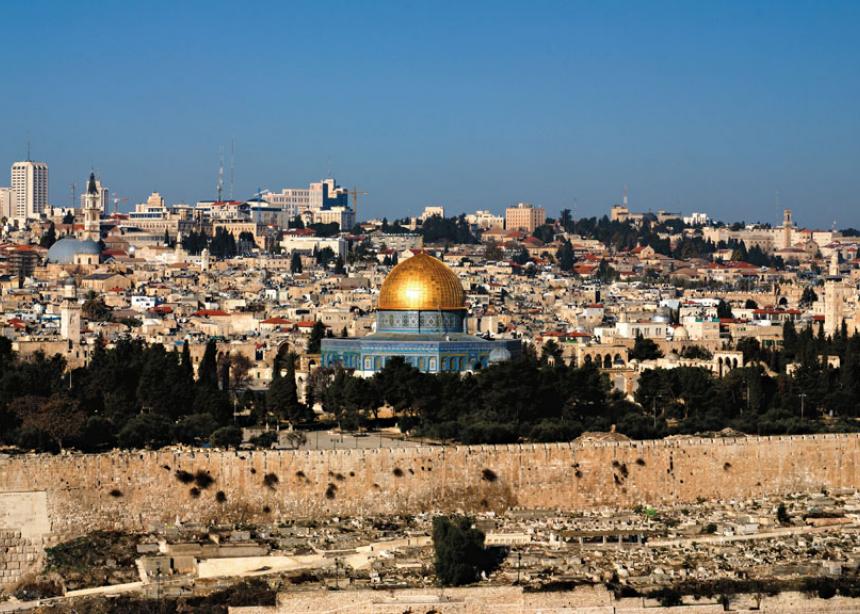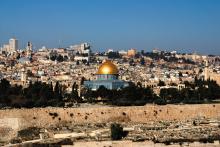Tourism is often promoted for the sake of economic development and toward the goal of breaking down stereotypes and barriers. A companion and I just returned from the Holy Land. My thoughts are filled with how our travel promotes or hides our values concerning peace and the good we wish to see in the world.
“The Holy Land”: how else to name it—Israel, Palestine, Israel-Palestine, Palestine-Israel? Any of these choices highlight certain facts and narratives, while hiding others. But, as our tour guide to the Dead Sea said when the topic of the people living in the region came up, “Let’s not talk politics.”
He was willing to talk about Bedouins and their centuries of nomadism. He would talk about ancient history—Bible geography, Roman empire, Jesus, monasteries—but wouldn’t say much about the present, even as we sat on the West Bank of the Jordan River, which is really just a creek now.
By saying he wouldn’t talk about “politics,” he certainly was engaged in political talk. The story of the Indigenous people of the Holy Land before the return of Jews in the past century is concealed, just as Indigenous peoples on Turtle Island were obscured.
“There is some conflict,” he said, “but let’s not talk politics.”
As we drove past tourist sites in the “occupied Palestinian territories” (the United Nations term), our guide never mentioned that term, nor even the word “Palestine.” I could not find “occupied” or “disputed” (the Israeli government term) in the several guidebooks we carried. Nor was construction on the hillsides pointed out, which turned out to be Israeli settlements on the occupied land—illegal according to international law.
Our original intent had been to stay in the “safe” cities of Tel Aviv and Jerusalem, but we realized the picture of the land we were getting from there was too narrow. We headed to Bethlehem, which is also in the West Bank, under Palestinian governance.
After the urban buzz of Jerusalem, I remarked about Bethlehem’s quiet to our Palestinian taxi driver. He explained, with frustration, that foreigners usually come only for a couple of hours and mostly on scheduled tours. They don’t stay in hotels or even eat many meals. They spend most of their money in Jerusalem. A UN report noted that only 20 percent of visitors to Palestine stay overnight. “They have heard too many things, as if it is dangerous here,” our driver said. “And we Palestinians struggle even more.”
According to the website of the Sabeel Ecumenical Liberation Theology Center, many tourists do not realize that Israel has “annexed” the tourism industry. Israel, it says, “restricts tourist access to Palestinian sites [and] favours Israeli tour companies.” Amnesty International points out that major online booking platforms offer accommodation in illegal settlements in Palestinian territory. Sabeel asks for prayer that, “tourists will make careful choices when undertaking visits to the Holy Land and especially that they will select tourist companies that refuse to profit from illegal Israeli settlements.”
I know the virulent history of antisemitism that has put Jews in danger for the entirety of the Christian era. But the operations of modern Israel follow a settler-colonial path: to take over a land and make it their own as if the land were empty or the existing people would go extinct. We Canadians are familiar with our own history claiming terra nullius (empty land), and the Doctrine of Discovery that legitimized oppression of Indigenous residents.
My appetite is whetted to learn more. It is time to revisit Mennonite Church Canada’s 2016 “Resolution on Palestine and Israel,” and the work of its Palestine-Israel Network (mennonitechurch.ca/pin).
Randy Haluza-DeLay lives in Toronto, and can be reached at haluzadelay@gmail.com.
Read more Mind and Soul columns:
Everything is connected
Dandelions for the Gospel
Chickadee as sacrament
Beyond free speech
Say no to moralistic therapeutic deism





Comments
Thank you, Randy, for your insight on this matter. Having been to Palestine many times, I continue to be discouraged by the hypocrisy that western governments show by ignoring the issues faced by the Palestinian people. The occupation must end.
I appreciate this honest reflection. In my experience also, tourism seeks to sanitize much and to package up a story that is comfortable, palatable and asks little back in return.
Being a pilgrim, on the other hand, is much different than being a tourist. A pilgrim seeks to be enlightened and to know the truth of a place and in so doing to know perhaps some truth in oneself.
Tourism is consumption. Pilgrimage is transformation.
I suspect being an honest pilgrim in the Holy Land today is hard work - holding many truths, sometimes opposing ones, together at the same time and being open to hearing multiple narratives. Thanks for leading the way!
Thanks for the frank and insightful column. So many friends and acquaintances who go, especially pastors, return with touristy comments, and miss the suffering and injustice. Christians need to contribute to the deescalation of ideological distortion at play there, and to just solutions, that reflect Gospel healing for all. Such solutions need to do justice to all, and discriminate against none. Thanks for pointing in this direction.
Add new comment
Canadian Mennonite invites comments and encourages constructive discussion about our content. Actual full names (first and last) are required. Comments are moderated and may be edited. They will not appear online until approved and will be posted during business hours. Some comments may be reproduced in print.